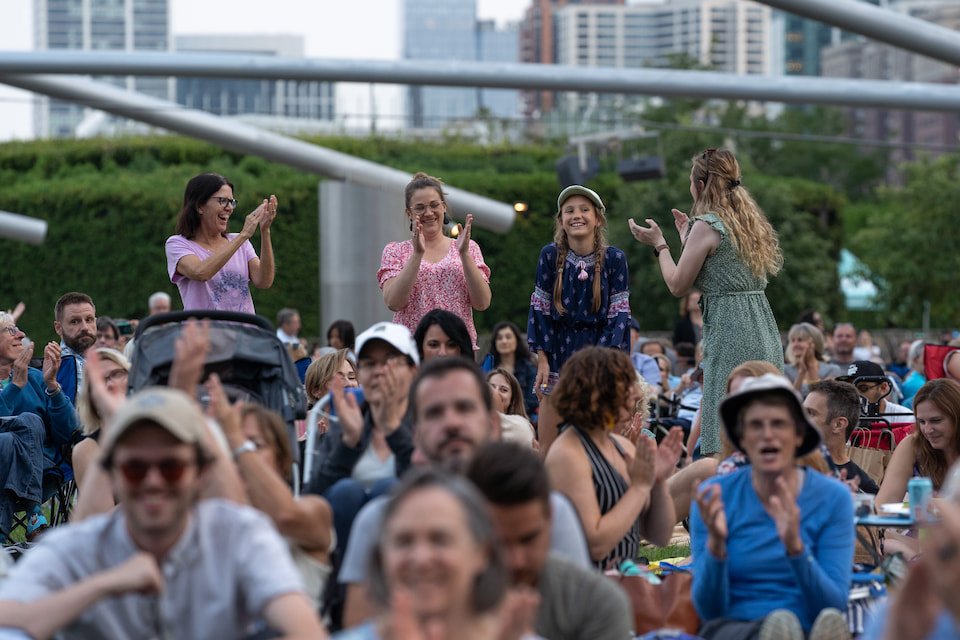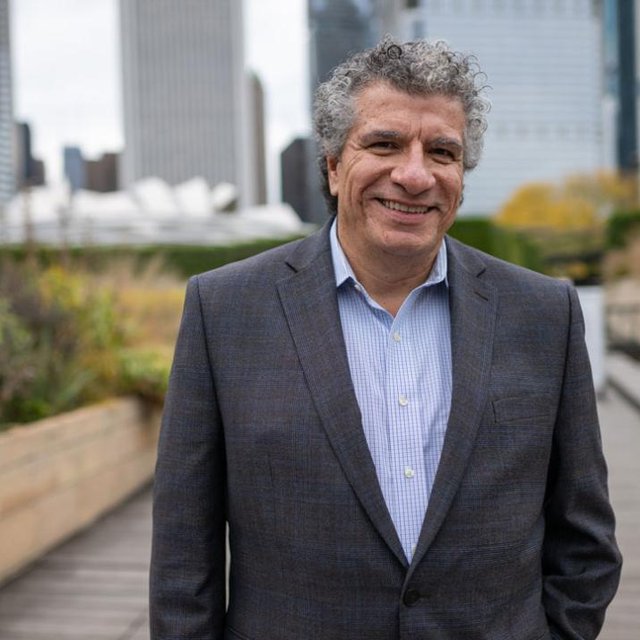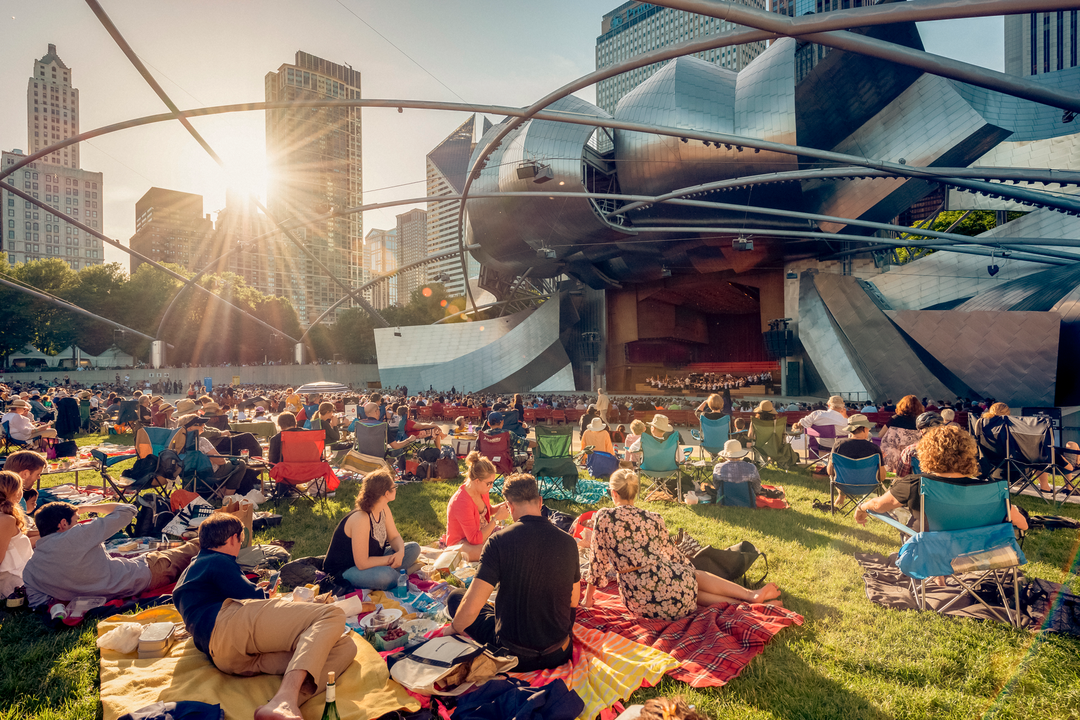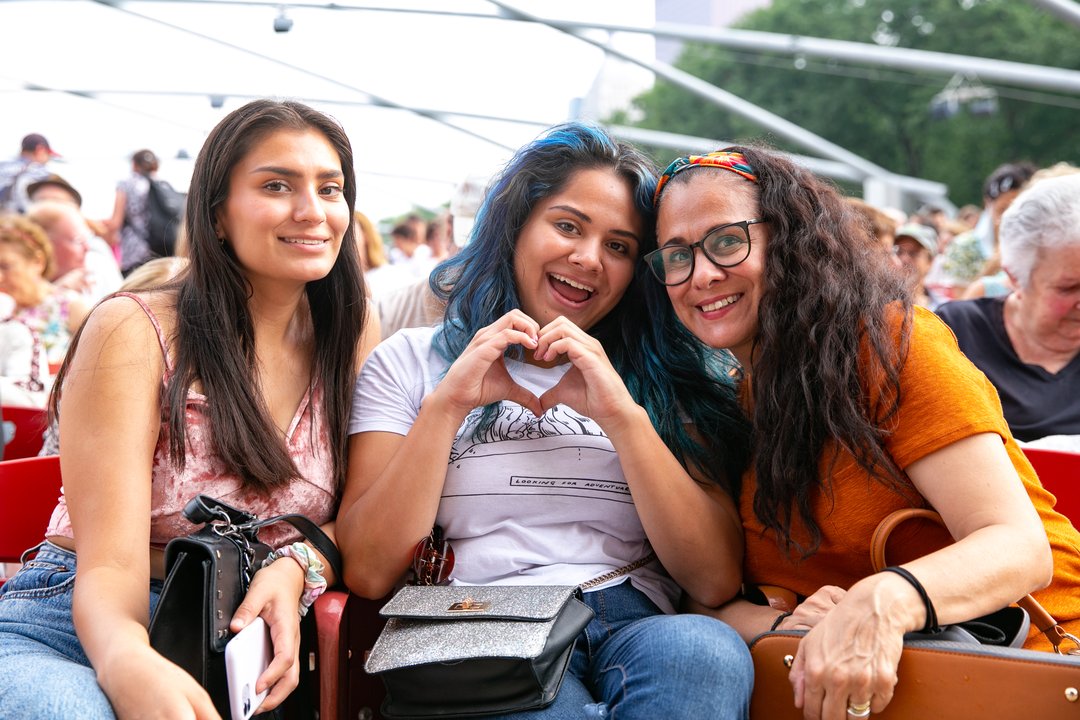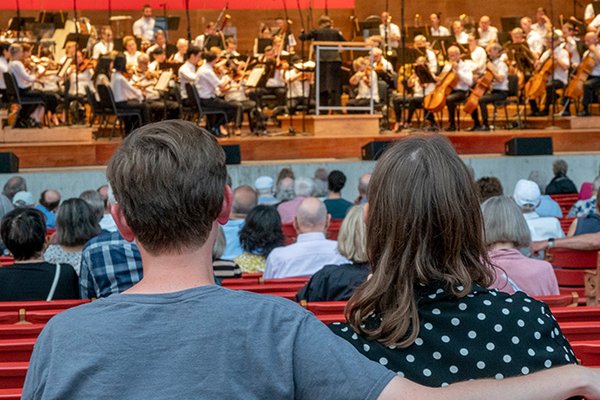
Mozart Paris Symphony
Program
Ralph Vaughan Williams Fantasia on a Theme by Thomas Tallis (15 mins)
Valerie Coleman Phenomenal Women (27 mins)
Maya
Katherine Johnson
Serena Williams
Caravana
Michelle Obama
Claressa Shields
Wolfgang Amadeus Mozart Symphony No. 31, Paris (22 mins)
Allegro assai
Andantino
Andante
Allegro
Featuring
-
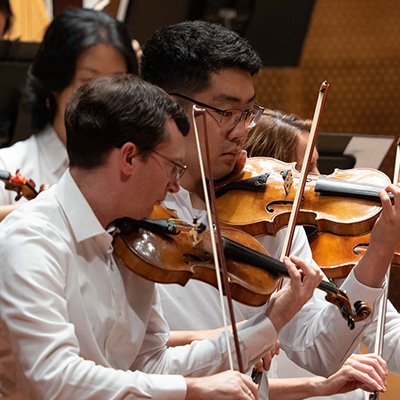
Grant Park Orchestra
Orchestra
-
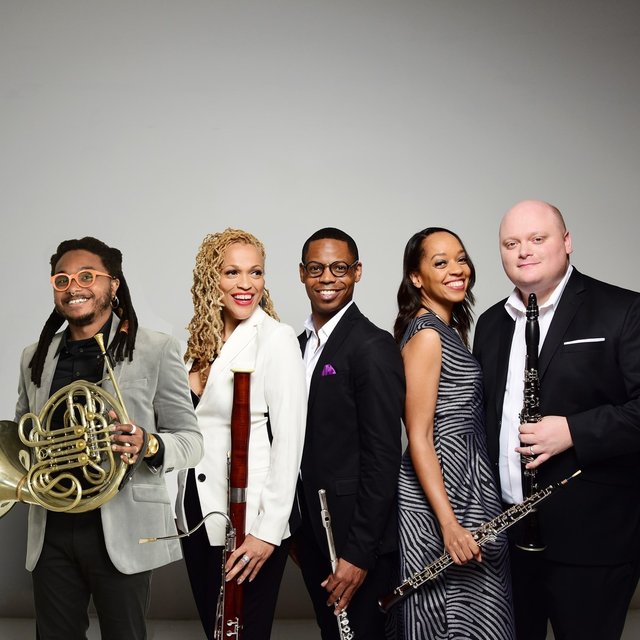
Imani Winds
Woodwind Quintet
Program Notes
Ralph Vaughan Williams (1872–1958)
Fantasia on a Theme by Thomas Tallis (1911)
Scored for: Double string orchestra and solo string quartet
Performance time: 15 minutes
First Grant Park Orchestra performance: June 28, 1997; William Eddins, conductor
When Ralph Vaughan Williams was commissioned to write a piece for the prestigious Three Choirs Festival at Gloucester Cathedral in 1910, he looked to England’s past for inspiration. Between 1904 and 1906, Vaughan Williams had been almost singularly focused on compiling, editing, and composing hymns for The English Hymnal. Several melodies from the hymnal made their way into his own compositions, including a psalm tune by 16th-century English composer Thomas Tallis.
The Phrygian-mode melody Vaughan Williams used in Fantasia on a Theme by Thomas Tallis is the third of nine psalm tunes Tallis contributed to Archbishop Matthew Parker’s 1567 psalter. Vaughan Williams pays further homage to English music history by casting the work as a string fantasia, a popular genre of consort music during the Tudor period that had regained popularity in the early 20th century. This rooting in England’s musical past, including his promotion of English folk song, helped Vaughan Williams cultivate the “quintessential Englishness” that came to characterize his output.
Vaughan Williams scores the Fantasia for two string orchestras (the second only comprising nine players, placed in the distance) plus a solo quartet in the foreground. This use of distinct groups provides a wealth of sonic possibilities and mirrors the resonant acoustics of Gloucester Cathedral. The theme is first introduced by the low strings in haunting pizzicatos. Vaughan Williams employs Tallis’s original four-part harmony for the first full statement of the theme by the combined orchestras, followed by a second statement with more elaborate accompanimental figures. He then divides the musical material into fragments and puts the ensembles in antiphonal conversation with one another, exploring the potential of Tallis’s theme to the fullest.
Valerie Coleman (b. 1970)
Phenomenal Women (2018)
Scored for: two flutes, one oboe, two clarinets, one bassoon, two French horns, two trumpets, one trombone, tuba, timpani, harp, strings, and solo woodwind quintet
Performance time: 27 minutes
First Grant Park Orchestra performance
“It’s in the reach of my arms,
The span of my hips,
The stride of my step,
The curl of my lips.
I’m a woman
Phenomenally.
Phenomenal woman,
That’s me.”
– excerpt from Maya Angelou’s “Phenomenal Woman”
Founder and former flutist of Grammy Award-winning wind quintet Imani Winds, Valerie Coleman is equally accomplished as a composer and performer. In 2017, Anne Midgette of The Washington Post named her one of the “Top 35 Women Composers” of the 20th and 21st centuries. Coleman wrote Phenomenal Women, a six-movement concerto grosso for wind quintet and chamber orchestra, for Imani Winds and the American Composer’s Orchestra in 2018. Inspired by Maya Angelou’s poem “Phenomenal Women” (first published in And Still I Rise in 1978), the work celebrates five influential women who overcame adversity with grace: Maya Angelou, NASA mathematician Katherine Johnson, tennis star Serena Williams, First Lady Michelle Obama, and Olympic boxer Claressa Shields, who has brought greater awareness to the water crisis in her hometown of Flint, Michigan. The commonality between these women, Coleman said, is that “They figured out a way through their own determination to not only persevere through [adversity] but thrive.”
Although containing no lyrics, the first movement traverses Maya Angelou’s poetry, from “Still I Rise” to “I Know Why the Caged Bird Sings” to the eponymous poem. As Coleman describes the movement, “There’s a certain calypso feel to it; it’s sexy but at the same time it’s very bold.” Coleman deploys subtle tone painting in her portraits. For instance, “Serena” captures the percussive thwack of a tennis ball, while staccato oboe notes stream like binary code before the spaceship eventually lifts off in “Katherine.” In the middle of these character portraits is “Caravana,” which is dedicated to the migrant women walking in caravans across the southern border, only to be separated from their children. In this movement, the solo flute plays a two-note figure reminiscent of Brahms’s Lullaby in a poignant reminder of the migrant mothers’ heartbreak.
Wolfgang Amadeus Mozart (1756–1791)
Symphony No. 31 in D major, K. 297, Paris (1778)
Scored for: two flutes, two oboes, two clarinets, two bassoons, two French horns, two trumpets, timpani, and strings
Performance time: 22 minutes
First Grant Park Orchestra performance: July 8, 1966; Irwin Hoffman, conductor
The last time Wolfgang Amadeus Mozart was in Paris, he was a child prodigy being paraded around in front of aristocrats. Now 22, he returned to Paris on one final European tour with his mother, Anna Maria Mozart. The primary goal of this trip, like the others before it, was to secure well-paid permanent employment under a weather patron. To his father’s dismay, he never sealed the deal. He failed for various reasons—personality clashes, differing musical tastes, and, as was the case in Paris, bad luck.
After a few months in Mannheim, Mozart and his mother arrived in Paris in the spring of 1778. Only one major work came out of his six-month residency there, his so-called “Paris” Symphony No. 31, K 297. The symphony was a great success, but Mozart’s trip was cut short when his mother died soon after the premiere. Mozart remained in Paris through August for a repeat performance of the symphony, but after settling his affairs, he headed home to Salzburg.
Even discounting Anna Maria’s death, Mozart did not enjoy his time in Paris. He hated French music and suspected the Parisian musical establishment of professional sabotage. Nevertheless, following his father’s advice, he decided to cater to local tastes when composing the Paris Symphony. He wrote to his father, “The few intelligent Frenchmen who are there will like it . . . As for the stupid ones, I can’t see that there is any great misfortune in displeasing them. Still, I have hopes that even the asses may find something in it to give them pleasure.”
The Paris Symphony reveals Mozart’s knack for playing with the audience’s expectations. For instance, he adheres to the French convention of the premier coup d’achet, which simply means all instruments begin the piece together. This expectation bemused Mozart, who wrote, “What a fuss these boors make of this! What the devil! I can’t see any difference—they all begin together—just as they do elsewhere. It’s a joke.” Mozart opens the piece with three decisive D-major chords in full orchestra, almost parodying the convention. However, he begins the finale with just the first and second violins, marked piano, before a forte tutti entrance eight bars later. This surprising twist caused the audience to break into delighted applause mid-movement at the premiere. Mozart conformed with Parisian norms in his instrumentation as well, employing the largest orchestra he had used thus far. He also incorporated clarinets for the first time, having first encountered the instrument in Mannheim before arriving in Paris.
The work’s crowd-pleasing musical fireworks, with its resounding unisons, dramatic dynamic contrasts, and pleasing melodies, belie an underlying sophistication and density of musical ideas that sets Mozart apart from many of his contemporaries. At least one person in the audience caught on to this complexity. The director of the concert series for which Mozart had written the Paris Symphony said the slow movement had “too many ideas.” Therefore, for the second performance in August, Mozart decided to replace it with a new Andante. Both the Andantino in 6/8 (thought to be the original slow movement) and the Andante in 3/4 will be played tonight in direct succession.
—Katherine Buzard
Artistic Leadership
-
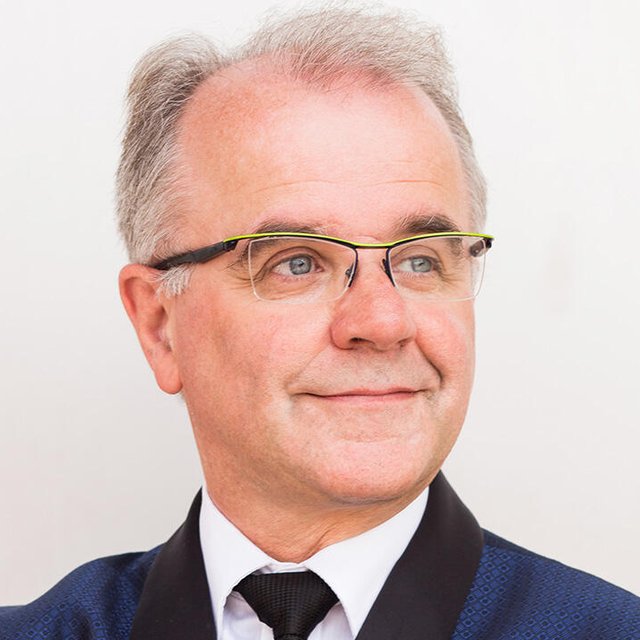
Christopher Bell
Chorus Director
Support The Festival
Violin I
Jeremy Black, concertmaster
Vacant, assistant concertmaster
Trista Wong
Zulfiya Bashirova
Jennifer Cappelli
Injoo Choi
Dima Dimitrova
Erica Hudson
Hyewon Kim
Matthew Lehmann
Jayna Park
Rika Seko
Karen Sinclair
Bonnie Terry
Krzysztof Zimowski
Violin II
Liba Shacht, principal
Vacant, assistant principal
Ying Chai
Ran Cheng
Karl Davies
Likai He
Ann Lehmann
Laura Miller
Cristina Muresan
Kjersti Nostbakken
Irene Radetzky
Jeanine Wynton
Thomas Yang
Viola
Terri Van Valkinburgh, principal
Yoshihiko Nakano, assistant principal
Elizabeth Breslin
Beatrice Chen
Amy Hess
Rebecca Swan
Chloé Thominet
Cello
Walter Haman, principal
Peter Szczepanek, assistant principal
Calum Cook
Larry Glazier
Steven Houser
Eric Kutz
Eran Meir
Double Bass
Colin Corner, principal
Peter Hatch, assistant principal
Andrew Anderson
Christian Luevano
Samuel Rocklin
Chunyang Wang
Chris White
Flute
Vacant, principal
Alyce Johnson
Jennifer Lawson, assistant principal
Piccolo
Jennifer Lawson
Oboe
Mitchell Kuhn, principal
Vacant
Anne Bach, assistant principal
English Horn
Anne Bach
Clarinet
Dario Brignoli, principal
Trevor O’Riordan, assistant principal
Besnik Abrashi
Bass Clarinet
Besnik Abrashi
Bassoon
Eric Hall, principal
Nicole Haywood Vera Tenorio, assistant principal
Vacant
Contrabassoon
Vacant
Horn
Vacant, principal
Stephanie Blaha, assistant principal
Neil Kimel
Brett Hodge
Paul Clifton
Trumpet
David Gordon, principal
Mike Brozick
Vacant, assistant principal
Vacant
Trombone
Daniel Cloutier, principal
Jeremy Moeller, assistant principal
Bass Trombone
Alexander Mullins
Tuba
Andrew Smith, principal
Timpani
Daniel Karas, principal
Josh Jones, assistant principal
Percussion
Josh Jones, principal
Vacant, assistant principal
Doug Waddell
Harp
Kayo Ishimaru-Fleisher, principal
Keyboards
Christopher Guzman
Orchestra Librarian
Eliza Bangert, principal
Grant Park Chorus
* denotes leave-of-absence † 2025 Vocal Fellow
Laura Lynch Anderson
Kristina Bachrach
Madalynn Baez
Megan E. Bell
Alyssa Bennett
Tamara Bodnar
Kylie Buckham
Anna Joy Buegel
Laura Bumgardner
Katherine Buzard
Bethany Clearfield
Nathalie Colas
Carolyne DalMonte
Megan Fletcher
Kaitlin Foley
Saira Frank
Julia Frodyma
Katherine Gray-Noon
Kimberly Gunderson
Alexandra Ioan
Alexandra Kassouf
Darlene Kelsey
Olivia Knutsen
Marybeth Kurnat
Katelyn Lee
Kyuyim Lee+
Rosalind Lee
Veronica Mak
Hannah Dixon McConnell
Marie McManama
Kathleen Monson
Susan Nelson
Evangeline Ng
Máire O'Brien
Alexandra Olsavsky
Laura Perkett
Angela Presutti Korbitz
Alexia Rivera
Veronica Samiec
Emily Sinclair
Molly Snodgrass
Tiana Sorenson
Christine Steyer
Sarah van der Ploeg*
Lydia Walsh-Rock
Sherry Watkins
Emily Amesquita
Melissa Arning
Christina Bernardoni
Angela Born
Bethany Brewer
Julie DeBoer
Leah Dexter
Katrina Dubbs
Stacy Eckert
Margaret Fox
Catarine Hancock
Ruth Ginelle Heald
Sophia Heinz
Miya Higashiyama
Carla Janzen
Amy Allyssa Johnson
Kathryn Kinjo Duncan
Amanda Koopman
Anna Laurenzo
Jeannette Lee
Thereza Lituma
Chelsea Lyons
Victoria Marshall
Jessica McCarthy
Quinn Middleman
Ella Peters
Sarah Ponder
Emily Price
Stephanie Schoenhofer
Suzanne A. Shields
Marissa Simmons
Cassidy Smith
Aidan Spencer
Alannah Spencer
Margaret Stoltz
Carolyn Sundlof Boudreau
Gabrielle Timofeeva López
Elizabeth Vaughan
Corinne Wallace-Crane
A.J. Wester
Debra Wilder
Isabel Yang+
Charles Anderson
Enrico Giuseppe Bellomo
Justin Berkowitz
Madison Bolt
Hoss Brock
Steven Caldicott Wilson
Opal Clyburn-Miller+
John J. Concepción
Micah Dingler
Jared V. Esguerra
Alec Fore
Ace Gangoso
Klaus Georg
Tejas Gururaja
Paul Hunter
Garrett Johannsen
William Johnson
James Judd
Tim Lambert
Tyler Lee
Stephen D. Noon
Marcos Ochoa
Brett Potts
Nicholas Pulikowski
Peder Reiff
Samuel Rosner
Matthew W. Schlesinger
Joe Shadday
Aaron Short
Brian Skoog
Michael St. Peter
Ryan Townsend Strand
Alan Taylor*
Sean J. Watland
Nate Widelitz
Walter Aldrich
Evan Bravos
Matthew Brennan
Michael Cavalieri
Ryan J. Cox
Ed Frazier Davis
Lifan Deng
Matthew Dexter+
Chris DiMarco
Christopher Filipowicz
Dimitri German
Dominic German
David Govertsen
Spencer Greene
Brian Hupp
Jan Jarvis
Jess Koehn
Eric Miranda
Ian Morris
Ian Murrell
John E. Orduña
Wilbur Pauley
Douglas Peters
Jackson Pierzina
Martin Lowen Poock
Ian Prichard
Dan Richardson
Stephen Richardson
Benjamin D. Rivera
Scott Uddenberg
Schyler Vargas
Vince Wallace
Aaron Wardell
Ronald Watkins
Jonathon Weller
Peter Wesoloski
Jonathan Wilson
Chuck Foster
John Goodwin
Kyuyim Lee
Isabel Yang
Opal Clyburn-Miller
Matthew Dexter
